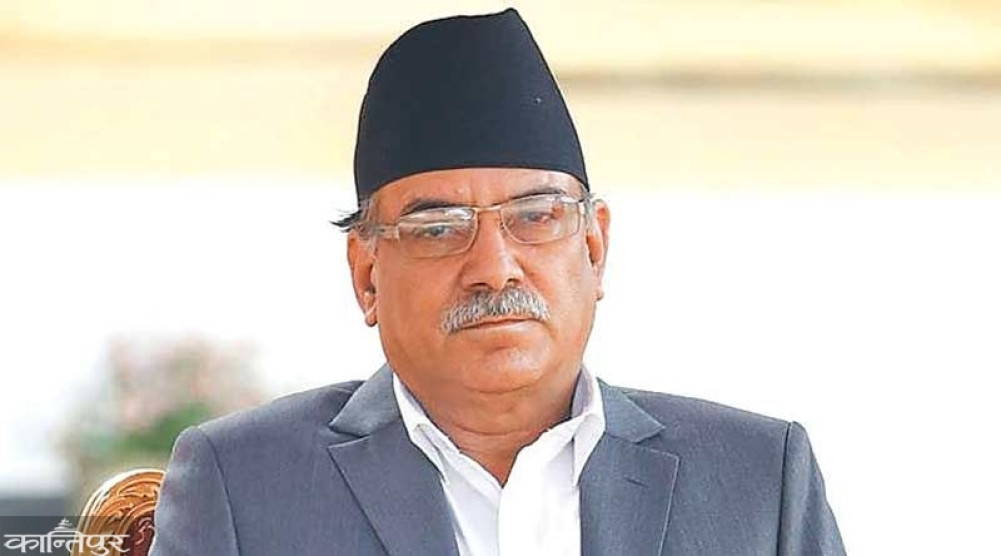Budget gossip continues
We use Google Cloud Translation Services. Google requires we provide the following disclaimer relating to use of this service:
This service may contain translations powered by Google. Google disclaims all warranties related to the translations, expressed or implied, including any warranties of accuracy, reliability, and any implied warranties of merchantability, fitness for a particular purpose, and noninfringement.


NTC or Ncell tower in the village. Central radio does not record transmissions. With great difficulty, I got an opportunity to read the budget through a pen drive sent by a friend from headquarters. It was seen that the federal budget, which was read with care, was neither timely nor aware of the needs of the majority of the people.



A long time ago, i.e. during the reformed Panchayat period. It was a sunny day and we were going from one village to another village to deliver election gossip to the people. At that time we were trying to win one candidate. Meanwhile, a middle-aged Lahure who was working in Karesa turned to our hool and shouted, "Where are you running, friend?"
One of us jokingly replied, 'We're going to gossip, mate.'
He stopped and asked, 'To talk or gossip?'
We were shocked. For us, gossip and talk seemed to be the same. He began to distinguish between gossip and talk while relaxing in the cool shade of the nearby groom-people. "Do you see that thick forest of Kholsapari?" He pointed to the forest about a kilometer away and said, "When I came from Lahore on my second vacation, I had also bought a gun.
One day I went out to play hunting in the forest with a loaded gun. After 2-3 hours of running, a deer was found. Shot, the victim died. I did not dare to carry it. Dragging it to the path. Peel the chicken and remove the skin. Take out the meat and divide it. I waited for some Batuwa or villager to come, till evening no one came. Suddenly there was a knock-knock sound. Surprise! The tusks of the deer I had cut were quickly attached to each other. Looking at it, the skinned deer was prepared by joining the pieces, and the deer entered the skin that I had taken and in a moment, mocking me, took the path of the forest.'
We were shocked to hear his story. He was serious.
I asked Lahure, 'Is this gossip or talk?'
He said, 'Budhu, don't you know that much? This is gossip. The matter is twofold. Based on facts. There is no scope for mystery and deception. It is based on faith.'
is not discussable, but the budget?
When I was a teenager, the villagers were eager to listen to 'Mero Sarkarwala' policy programs and budget speeches even during the peak of June. Farmers were particularly interested in modern food fertilizers (chemicals), hybrid seeds, agricultural implements and irrigation canals, Malpot (land tax) and other infrastructure. After the speech, there was a debate comparing the previous year. Yesterday-today the tradition of that village is broken. No one said anything about this year's budget either because it was not worth hearing or because they did not understand the meaning even after hearing it. Even the economics principal of the college did not mention the incident in the meeting. Are there any points to discuss the budget speech which is covered in 347 points?
When looking at the capital, it was seen that some industrialists of the country were less business leaders, so they spent words in appreciating the budget. The economic reform agenda put forward by Finance Minister Varshman Pun was interpreted by the Confederation of Industry and Commerce and the Chamber of Commerce as saying 'neither past nor future'. Some ex-bureaucrats were read to discuss the positivity of the budget at length. In the same way, not only opposition party leaders KC, Koirala and Thapa, but Oli and one of his vice presidents, who are ruling the government as the main pillar, and their comments on the budget were also seen and heard. But these comments did not create a serious debate among the general public about budget allocation. Because this or that budget can solve the problems faced by the country, there is no faith in the general public that social justice will be established.
When the government starts the budgeting process, it has to find out what are the main problems that the country is facing. Nepal has been experiencing economic recession for a long time. When economic activity is weak, investment, reinvestment, savings, profit, employment, reproduction, distribution become relaxed. In almost a decade, the capital formation process in Nepal has decreased by 10 percent. Sovereign debt has risen to almost half of GDP (24 trillion). We are forced to pay the interest of about four billion annually. As the economy slows down, the debt ratio increases, and the annual principal and interest installments expand accordingly. If
continues to grow like this, it seems certain that the country will fall into a debt trap. Declining growth rate of capital formation in the economy means that common man's share in national income is ending. Lack of income means lower consumption on average. A fall in consumption means a disincentive to production. This means a cycle of reduced employment, reduced profits and reduced investment. A decrease in all these means that the country's economy will be pushed into a long-term recession.
There is a situation where the existing tax revenue cannot cover the annual current expenditure. 50 billion more than the development budget, if the situation of having to pay interest on internal and external loans continues, the development budget will not be mentioned in the budget until the end of the next periodic planning period. In such a situation, the whole youth of the country may have to go abroad with their families to borrow the word capital formation or to make a living.
Gossip about the new phase of economic reform
Finance Minister Pun has announced five strategies for reform in the 24th point of the budget. (a) structural reform (b) business environment reform (c) public finance reform (d) financial sector reform and (e) public administration reform. He seems to consider this program as a milestone of the budget. Looking at the detailed explanation of the points of those reforms, it is understood that reforms are sought by breaking the principles of neoliberal economy in terms of policy.
Number one is 'Integrated Economic Corridor Development', 'Development of Digital Economy', 'Development of Green Economy' as structural reforms. In the language of capitalist economics, 'economic structure' means the components of the macro economy. Marxist and reformist economists consider the economic structure or framework to be the main economic means of production, i.e. the means of production within the economic production system. Such as: distribution of natural resources, structure and control of international and national trade, structure of industry and business, protection of national interests and social share in infrastructure construction of the state, tax system and distribution of the state, etc.
There are two practices still going on in the world about economic structure. Socialism-oriented or socialist in the economic structure
seeks change. Such as: land reform, policy change of industrialization, protection of enterprises in import promotion. In what is called the socialist or state-capitalist path, the role of the state remains dominant. Second, the structural adjustment program. It seeks to improve the existing framework by keeping it as it is. The latter is the basic mantra of a market economy. We have been in this structural adjustment for almost four decades.
The latest reform sought by the finance minister is the third reform within the neoliberal framework. After the first Prakashchandra Lohani, the second Ramsharan Mahat, he seems to be trying to become the third. The reality is that the continuation of this policy to create a high-level economic reform commission or to use other tools in the future is unlikely to save Nepal from economic recession and bring prosperity to the country. In the same way, the leadership that is theoretically, ideologically void, organizationally weak and standing on the feet of others does not have the power to bring any kind of structural and public reform in the country based on a single decision. If it could be kept, it would have been done last year according to the announcement of the Administrative Reforms and Economic Reforms Commission.
In addition to transformation, gossip
Finance Minister has mentioned five areas of transformation in the budget after five points of reform. In order of priority are agriculture, energy, information and technology development, tourism promotion and lastly entrepreneurship industrial development. There is no consistency between the priorities and budget allocations set by him. The Minister of Finance, who said that he would transform the agricultural sector, has reduced the budget by 2 billion. Based on what they learned from going abroad, some farmers are doing commercial farming. Some have reared cows, buffaloes, goats, chickens. Some have grown cabbage, seasonal vegetables, potatoes and onions. Words of assurance are not enough for such enterprises to flourish and become self-sufficient. Protection and concessions are needed to avoid external high-scale manufacturing competition.
If we look at the past decade, various finance ministers have provided tax breaks and other concessions on food imports in collusion with one of the business houses. With the arrival of Bahudal, staple food (rice, maize, wheat, millet, barley) declined for similar reasons. Now commercial agriculture is being taken out in collusion. Even in this year's budget, it is not hidden from anyone that certain businessmen have the task of feeding the households.
In the development of the energy sector, multinational companies and neighbors have washed their hands for profit. There is no policy in the country on why, how and in whose interest the development of water resources should be done not only for energy but also for the whole. Especially energy as a raw material to sell electricity directly or to produce consumer goods and capital goods and utilize electricity and water? The answer to this question is found neither in the plan nor in the policy programme. The rulers (institutional elite) seem eager to hand over Nepal's water resources at the cost of kaudi. Energy has been given second priority in the budget. The long-term future of Nepali economy does not look good with such haphazard policies.
The Information, Communication and Technology (ICT) sector has contributed about 80 billion or 2.3 percent to the gross domestic product. It is growing but there is no master plan for its development and expansion in the country. Similarly, tourism is contributing 6.7 percent to the gross domestic product. But no effort has been made to uplift and expand it by keeping it close to agriculture and industry. No wonder why 'Entrepreneurship and Industrial Development' is at the bottom of the list to be transformed by the Finance Minister. When the view of overall development is weakened, the sense of responsibility towards the people as a whole becomes weaker. The need for industrialization has become more necessary today than yesterday. Especially to substitute imports, increase production and increase employment. Exiting from agriculture continues. But there are no other enterprises to follow him.
According to the recently published Nepal Living Standard Survey, the unemployment rate in Nepal has reached 12.6 percent. This rate was 11.4 percent in 2017/18 and 4.9 percent in 1995/96. Youth (age group 15-24) is currently 22.7 percent unemployed in the country. This is the case even though one-third of the country's people (prominent youth) are living outside the country. The ruling party has no interest in solving the growing unemployment. Why are the Chinese emphasizing industrialization and entrepreneurship?
Why did Americans introduce a new industrial policy in 2021? Why did the Indian people bring Modi to size in this election? If production growth and unemployment problems are not solved, no system will last. However, in the field of Nepali economic politics, there is no thought, no interest and research about the steps being taken by the rich countries and their global impact and the awareness that should be adopted.
 प्रकाशित : असार १६, २०८१ ०७:३४
प्रकाशित : असार १६, २०८१ ०७:३४

 २४.१२°C काठमाडौं
२४.१२°C काठमाडौं


















